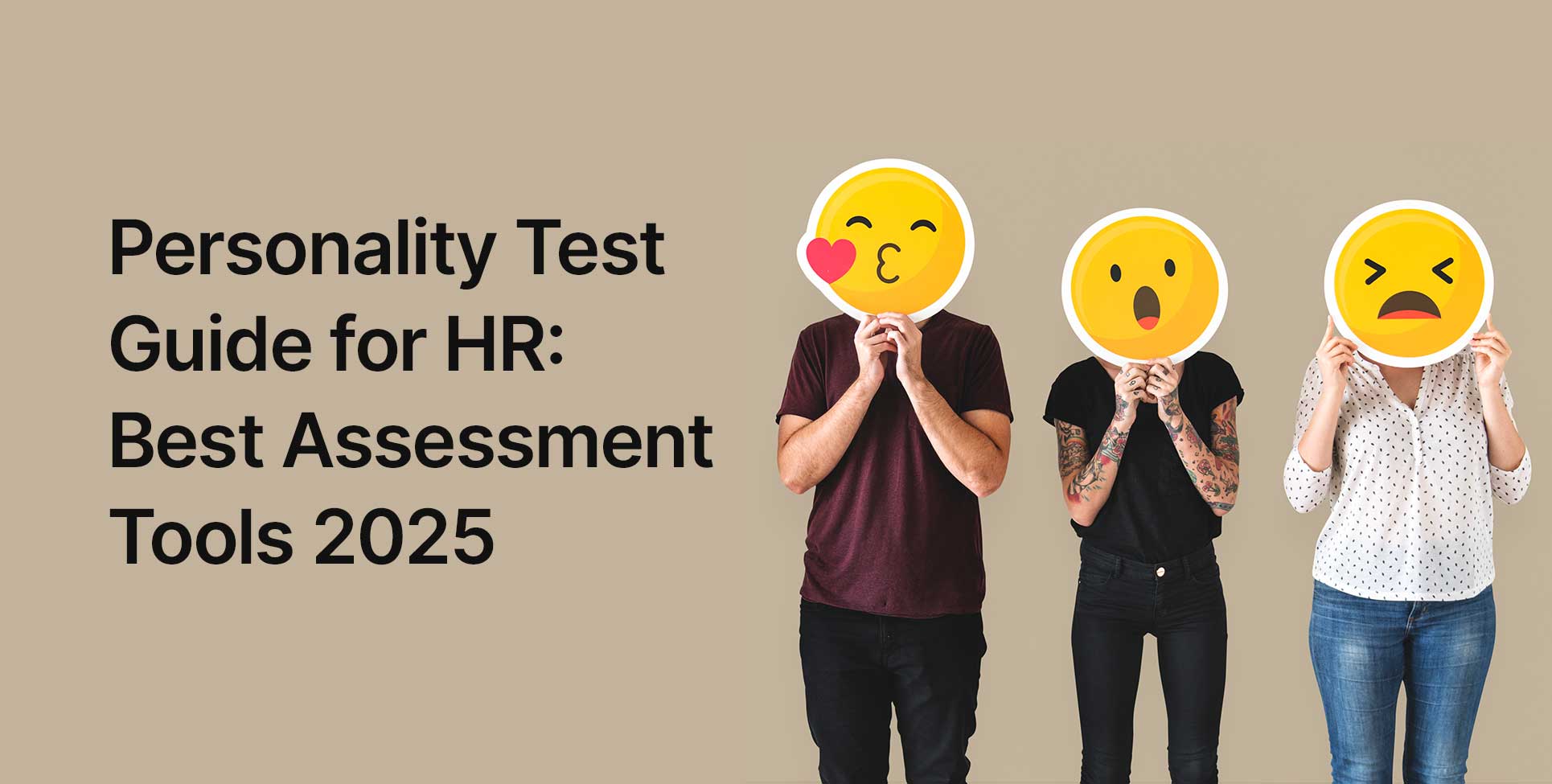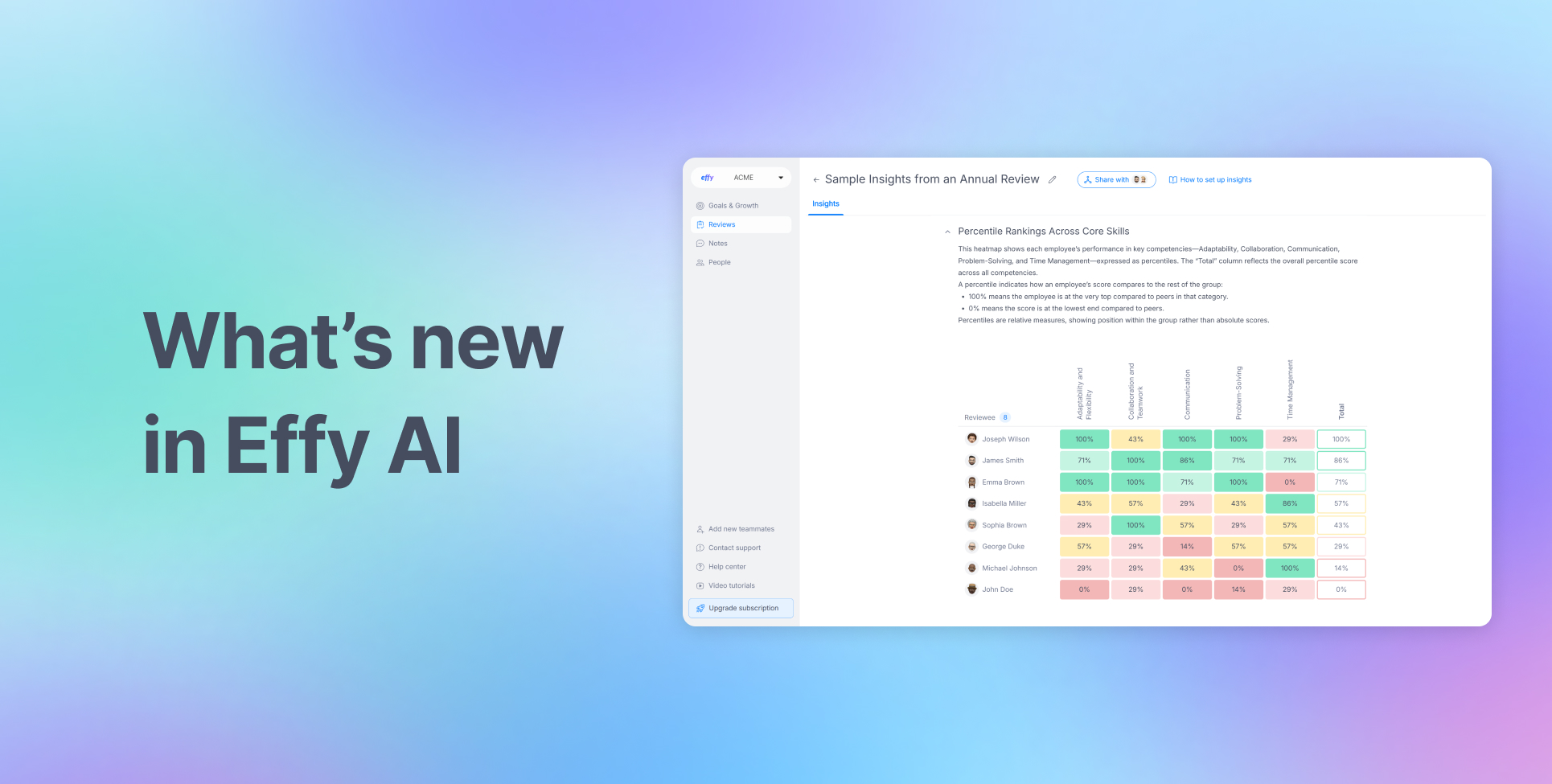Modern HR professionals increasingly rely on personality type tests to build stronger teams, improve communication and make better hiring decisions. Understanding individual personality differences helps create more effective workplace dynamics and employee development strategies.
Choosing the right online personality test for your organization requires understanding the strengths and weaknesses of different assessment tools. From scientifically validated options to simple questions for team-building exercises, each approach serves specific HR purposes and corporate needs.
This comprehensive guide explores the most popular workplace personality assessments, implementation best practices and important limitations to consider. Whether you're new to personality testing or refining existing programs, these insights will help optimize your HR assessment strategy.
Why you should consider a personality test in the workplace
Personality tests provide valuable insights into psychological type, employee behavior, communication styles and work preferences that can transform team dynamics and organizational effectiveness. These assessments help HR professionals make data-driven decisions about hiring, team composition and employee development strategies.
Improve team communication and collaboration
Understanding personality differences helps team members adapt their communication styles to work more effectively together. When colleagues recognize that some prefer direct feedback while others need gentle encouragement, they can adjust their approach to reduce conflicts and enhance productivity.
Enhance hiring and recruitment decisions
Personality assessments reveal whether candidates will thrive in your company culture and the right career. By identifying personality traits and trends that correlate with success in particular positions, HR teams can make more informed hiring decisions and reduce expensive turnover rates.
Develop targeted training and development programs
Personality statements help create customized learning experiences that align with individual preferences and strengths. Managers can design development opportunities, feedback sessions and even employee review form processes that resonate with different personality types, improving engagement and skill development outcomes.
Reduce workplace conflicts and misunderstandings
Many workplace tensions stem from personality clashes and communication mismatches rather than actual performance issues. Understanding personality differences helps managers identify root causes of conflicts and implement targeted solutions that address underlying behavioral patterns and preferences.
Build stronger leadership and management capabilities
Leaders who understand their own personality type and those of their team members can adapt their management style accordingly. This awareness enables more effective delegation, motivation strategies and performance management approaches that bring out the best in each individual.
Top 3 personality tests you can apply in HR
The market offers numerous online personality tests, but three stand out for their workplace relevance and practical application. Each test serves different HR purposes from team building to hiring decisions, helping organizations choose the right tool for their specific needs.
Myers-Briggs Type Indicator (MBTI)
The Myers-Briggs Type Indicator, often shortened as MBTI, categorizes individuals into 16 personality types based on four dimensions: Extraversion/Introversion, Sensing/Intuition, Thinking/Feeling and Judging/Perceiving. This MBTI test helps teams understand communication preferences and work styles for improved collaboration.
Pros:
- Widely recognized and easy to understand framework for personality discussions
- Excellent for team building and improving workplace communication dynamics
- Provides common language for discussing individual differences and preferences
Cons:
- Lacks scientific validity and reliability according to psychology research
- Forces binary choices that don't reflect personality complexity
- Not predictive of job performance or career success
Big Five
The Big Five personality model measures five key traits: Openness, Conscientiousness, Extraversion, Agreeableness and Neuroticism. This research-backed assessment is considered the most scientifically valid personality framework for workplace applications and hiring decisions.
Pros:
- Strong scientific foundation with extensive research supporting its validity
- Predictive of job performance, leadership effectiveness, and career structure
- Measures personality on continuums rather than binary categories
Cons:
- More complex to understand and implement than simpler free personality tests
- Requires proper training for accurate interpretation and application
- Can be time-consuming and expensive for large-scale organizational use
Color personality test
Color personality tests, such as True Colors or DISC assessment, assign personality types to different colors (typically four) representing distinct behavioral styles. These simple, visual assessments are popular for team-building activities and basic workplace communication improvement.
Pros:
- Extremely easy to understand and remember for most people
- Quick to administer and cost-effective for large groups
- Creates immediate visual reference for team dynamics and communication
Cons:
- Oversimplified approach that may not capture personality complexity
- Limited research supporting accuracy or workplace effectiveness
- May reinforce stereotypes rather than promoting genuine understanding
Limitations of personality tests
While personality tests offer valuable workplace insights, they come with significant limitations that HR professionals must understand. These quizzes should complement, not replace, comprehensive evaluation methods and human judgment in hiring and management decisions.
Risk of oversimplification and stereotyping
Personality tests can reduce complex human behavior to simple categories, leading to oversimplified judgments about employees' capabilities and potential. This categorization may create unfair stereotypes and limit opportunities for individuals who don't fit expected psychological types for certain roles.
Legal and ethical concerns in hiring
Using personality tests in recruitment processes may inadvertently discriminate against certain groups or violate employment laws. Some assessments can reveal protected characteristics or create barriers for candidates with disabilities, potentially exposing organizations to legal liability and discrimination claims.
Inconsistent results and measurement issues
Many personality tests lack reliability, with individuals often receiving different results when retaking the same assessment. Environmental factors, mood and life circumstances can influence what the statement describes, making it difficult to trust test results as accurate representations of stable personality types.
Best practices for conducting a personality test
Implementing personality type tests effectively requires careful planning, proper training and clear guidelines to maximize benefits while minimizing risks. Following established best practices helps ensure ethical implementation, accurate results and meaningful outcomes for both employees and the organization.
Choose scientifically validated assessments
Select online personality tests with strong research backing and proven reliability rather than popular but unvalidated options. Prioritize assessments that have undergone peer review, demonstrate predictive validity and meet professional psychological testing standards for workplace use.
Takeaway: Invest in quality personality type test backed by scientific research to ensure reliable and meaningful results.
Provide proper training for administrators
Ensure all staff conducting or interpreting personality traits receive comprehensive training on administration, scoring and interpretation. Untrained administrators can misinterpret results, leading to poor decisions and potential legal issues in hiring or employee development.
Takeaway: Never conduct free personality tests without proper training and certification in the chosen tool.
Maintain confidentiality and voluntary participation
Protect employee privacy by keeping results confidential and ensuring participation remains voluntary whenever possible. Clearly communicate how results will be used, who will have access and establish secure storage protocols for sensitive personality data.
Takeaway: Respect employee privacy and make participation voluntary to build trust and ensure ethical implementation in the full report.
Use results as one factor among many
Avoid making hiring or promotion decisions based solely on online personality test results. Combine insights with performance data, skills assessments, interviews and other relevant factors to create a comprehensive evaluation framework.
Takeaway: Personality tests should inform decisions, not determine them so always use multiple evaluation criteria.
Focus on development rather than selection
Emphasize using personality type assessments for employee development, team building and communication improvement rather than screening out candidates. This positive approach reduces legal risks while maximizing the benefits of personality insights for organizational growth.
Takeaway: Position free personality tests as development tools rather than elimination criteria to maximize positive impact.
Final thoughts
Personality type assessments offer valuable insights for HR professionals seeking to improve team dynamics, communication and employee development outcomes. When implemented thoughtfully with proper training and ethical guidelines, these tools can significantly enhance organizational effectiveness and workplace satisfaction.
The key to successful personality test implementation lies in choosing scientifically validated assessments and using results responsibly. Avoid relying solely on personality data for major decisions, instead integrating insights with comprehensive evaluation methods and human judgment.
Remember that personality type tests are tools for understanding and development, not definitive measures of employee worth or potential. Use them to foster better communication, build stronger teams and create more supportive work environments for all personality types.


